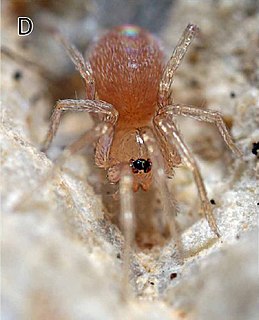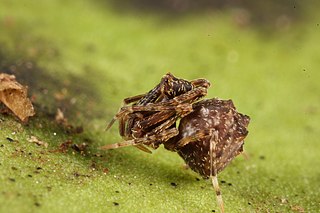
Oonopidae, also known as goblin spiders, is a family of spiders consisting of over 1,600 described species in about 113 genera worldwide, with total species diversity estimated at 2000 to 2500 species. The type genus of the family is OonopsKeyserling, 1835.

Eugène Louis Simon was a French naturalist who worked particularly on insects and spiders, but also on birds and plants. He is by far the most prolific spider taxonomist in history, describing over 4,000 species.

Humberto Ramos is a Mexican comic book penciller, best known for his work on American comic books such as Impulse, Runaways, The Spectacular Spider-Man, The Amazing Spider-Man and his creator-owned series Crimson.

Archaeidae, also known as assassin spiders and pelican spiders, is a spider family with about ninety described species in five genera. It contains small spiders, ranging from 2 to 8 millimetres long, that prey exclusively on other spiders. They are unusual in that they have "necks", ranging from long and slender to short and fat. The name "pelican spider" refers to these elongated jaws and necks used to catch their prey. Living species of Archaeidae occur in South Africa, Madagascar and Australia, with the sister family Mecysmaucheniidae occurring in southern South America and New Zealand.

The evolution of spiders has been ongoing for at least 380 million years. The group's origins lie within an arachnid sub-group defined by the presence of book lungs ; the arachnids as a whole evolved from aquatic chelicerate ancestors. More than 45,000 extant species have been described, organised taxonomically in 3,958 genera and 114 families. There may be more than 120,000 species. Fossil diversity rates make up a larger proportion than extant diversity would suggest with 1,593 arachnid species described out of 1,952 recognized chelicerates. Both extant and fossil species are described annually by researchers in the field. Major developments in spider evolution include the development of spinnerets and silk secretion.

Unicorn ("one horn", in Latin) is a genus of goblin spiders from South America, containing seven species that occur predominantly in high elevation, semi-desert regions of Bolivia, Chile, and Argentina. Individuals are relatively large for goblin spiders, measuring up to 3.0 mm (0.12 in) in body length. The genus name refers to a characteristic pointed projection between the eyes and jaws of males. In at least one species, broken-off tips of the male pedipalps have been found within the genitalia of females, postulated as a means of sperm competition. Unicorn possesses several traits that suggest it is a relatively "primitive" member of the Oonopidae, and is classified with other similar, soft-bodied goblin spiders in the subfamily Sulsulinae.
Orchestina rabagensis is an extinct spider which existed in what is now Spain during the late Albian age. It was described in 2012.

The Amazing Spider-Man 2 is a 2014 American superhero film based on the Marvel Comics character Spider-Man. The film was directed by Marc Webb and produced by Avi Arad and Matt Tolmach. It is the fifth theatrical Spider-Man film produced by Columbia Pictures and Marvel Entertainment, the sequel to The Amazing Spider-Man (2012), and the final film in The Amazing Spider-Man series. The studio hired James Vanderbilt to write the screenplay and Alex Kurtzman and Roberto Orci to rewrite it. The film stars Andrew Garfield as Peter Parker / Spider-Man, alongside Emma Stone, Jamie Foxx, Dane DeHaan, Campbell Scott, Embeth Davidtz, Colm Feore, Paul Giamatti, and Sally Field. In the film, Peter Parker deals with his relationship with Gwen Stacy as he investigates his parents' murder, while also facing the supervillain Electro, and the return of his childhood friend Harry Osborn, who is dying from a deadly genetic disease that killed his father.
Orchestina is a spider genus in the family Oonopidae. There are 71 accepted extant species in the genus.
Orchestina ebriola is a spider species found in Greece.
Orchestina longipes is a spider species found in Italy.
Orchestina pavesii is a spider species found in Spain, Slovakia, Bulgaria, Algeria, Canary Islands, Egypt and Yemen.
Orchestina setosa is a spider species found in France and Italy.
Orchestina simoni is a spider species found in France, Italy and Greece.
Orchestina dentifera is a species of spider of the genus Orchestina. It is endemic to Sri Lanka.
Orchestina tubifera, is a species of spider of the genus Orchestina. It is endemic to Sri Lanka.
Orchestina manicata, is a species of spider of the genus Orchestina. It is native to Sri Lanka and Vietnam.
Orchestina pilifera, is a species of spider of the genus Orchestina. It is endemic to Sri Lanka.
Orchestina elegans is a species of spiders in the family Oonopidae. It is found in the Philippines.






